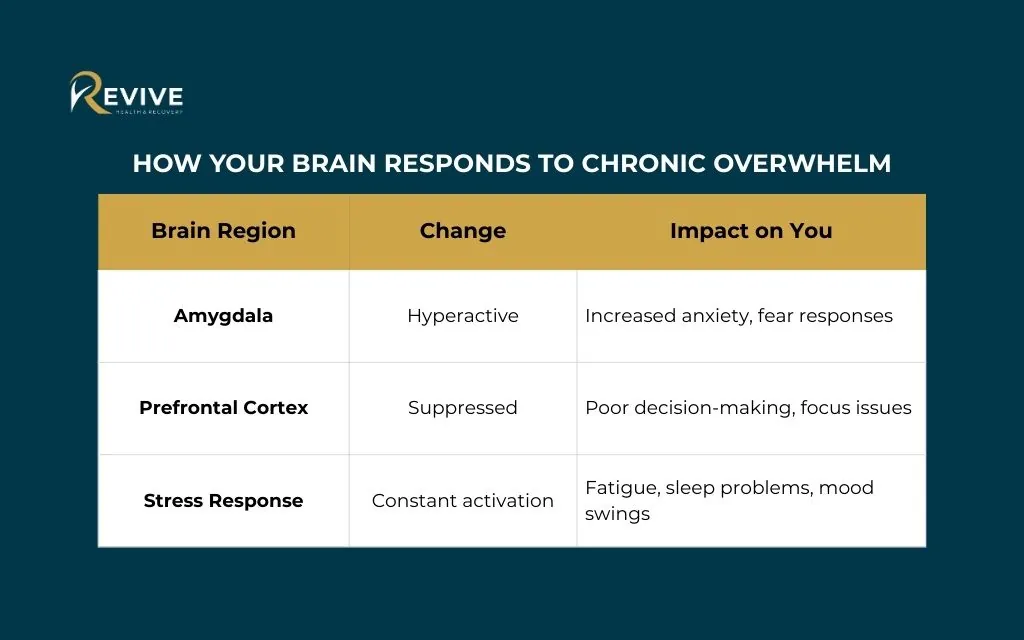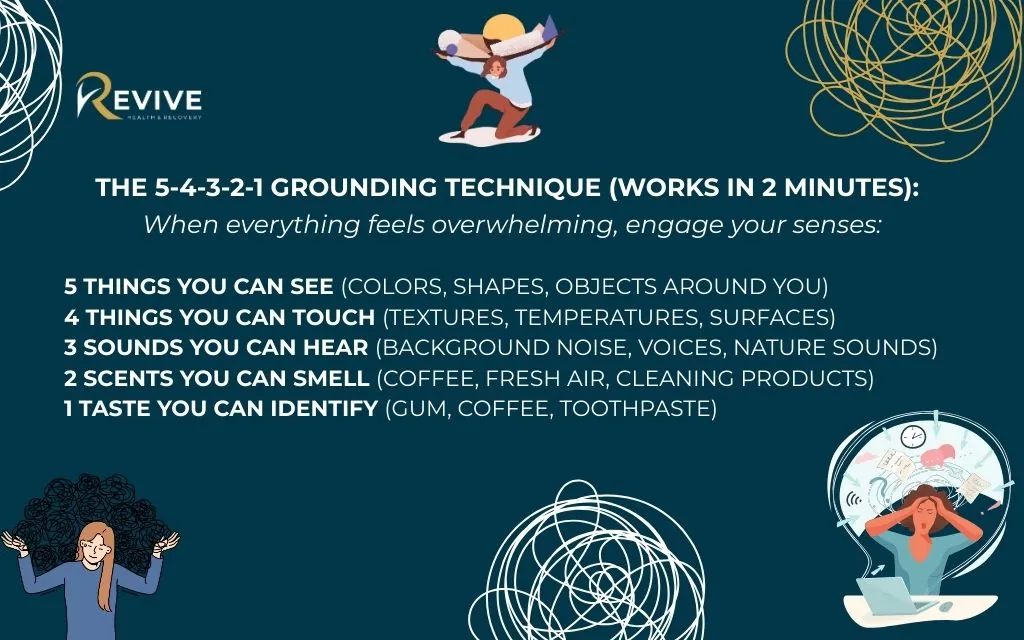If you find yourself constantly asking “why do I feel overwhelmed all the time?” you’re not alone. This persistent state of feeling flooded by thoughts, emotions, and responsibilities affects millions of people, particularly in fast-paced environments like Denver, Colorado.
From a scientific perspective, chronic overwhelm represents more than just stress. It’s a neurobiological state where your brain’s processing capacity becomes exceeded, triggering cascading effects on your mental and physical health. Understanding the root causes, from cognitive overload to underlying depression connections, is crucial for finding effective solutions.
This comprehensive guide explores the psychology and neuroscience behind chronic overwhelm, identifies contributing factors specific to modern life, and provides evidence-based strategies for recovery. If you’re struggling with persistent feelings of being overwhelmed, this article will help you understand your experience and discover pathways to healing.
The science behind feeling overwhelmed all the time
How your brain responds to chronic overwhelm
When you feel overwhelmed constantly, here’s what happens in your brain:

Your amygdala acts like a smoke detector that won’t stop beeping. Meanwhile, your prefrontal cortex (the brain’s CEO) gets overwhelmed and essentially “goes offline.” This explains why simple decisions feel impossible when you’re constantly overwhelmed.
Cognitive overload in the digital age
Think of your brain like a smartphone with limited processing power. Modern life bombards you with:
- 50+ notifications daily from various apps
- 8+ hours of screen time per day
- 24/7 news cycles creating information overload
- Constant connectivity eliminating mental downtime
Result? Your cognitive resources become depleted, leading to that familiar feeling where everything seems overwhelming and nothing feels manageable.
The overwhelm-depression connection
Chronic overwhelm shares neurobiological pathways with clinical depression. Both conditions involve similar neurotransmitter imbalances, particularly decreased serotonin and dopamine levels. This explains why people who feel overwhelmed all the time often develop depressive symptoms.
Research indicates that persistent overwhelm can trigger depressive episodes through stress-induced mood disorders. The same brain regions affected in depression become dysregulated during chronic overwhelm states. Understanding this connection helps explain why feeling constantly overwhelmed isn’t just a stress issue.
Treatment implications become crucial when overwhelm and depression occur together. Addressing both conditions simultaneously through evidence-based therapy produces better outcomes than treating either condition alone.
Common causes why you feel overwhelmed constantly
Modern life stressors in Colorado
Denver’s competitive job market creates unique pressure for professionals. The city’s rapid growth brings increased living costs, longer commutes, and workplace demands that contribute to feeling overwhelmed easily. Many residents struggle with work-life balance as industries expect constant availability.
High altitude affects some people’s stress tolerance and emotional regulation. Combined with Colorado’s outdoor lifestyle pressures and social media comparisons, residents often experience a perfect storm of overwhelm triggers. Climate change anxiety also impacts mental health, particularly among environmentally conscious communities.
Social media amplifies overwhelm through constant comparison and information overload. The digital age presents challenges our brains haven’t evolved to handle, creating persistent states where everything feels overwhelming.

Internal factors contributing to overwhelm
Perfectionism drives many people to set unrealistic expectations, leading to chronic overwhelm. When standards are impossible to meet, every task feels insurmountable. This pattern explains why some people get overwhelmed so easily while others handle similar situations with less distress.
Poor boundary setting allows responsibilities to accumulate beyond manageable levels. People-pleasing tendencies prevent saying no to additional commitments, creating cascading overwhelm. These behavioral patterns often develop early in life and require therapeutic intervention to change.
Underlying anxiety and depression amplify overwhelm responses. When your baseline stress level is already elevated, normal life challenges feel overwhelming. Trauma history affects emotional regulation, making current stressors feel unbearable even when objectively manageable.
Physical health factors
Sleep deprivation significantly reduces your capacity to handle stress. When you’re sleep-deprived, your brain’s emotional regulation centers function poorly, making you more susceptible to feeling overwhelmed by everything. Quality sleep is essential for maintaining psychological resilience.
Nutritional deficiencies, particularly B vitamins, magnesium, and omega-3 fatty acids, impact mood regulation and stress tolerance. Hormonal imbalances from thyroid dysfunction or adrenal fatigue create physiological conditions where normal stressors feel overwhelming.
Chronic pain and medical conditions create additional stress loads that reduce your available capacity for handling daily challenges. Physical health directly influences mental resilience, making holistic treatment approaches essential for recovery.
Recognizing the signs: Am I chronically overwhelmed?
Emotional and psychological symptoms
Persistent feelings of helplessness and hopelessness characterize chronic overwhelm. You might notice mood swings, irritability, and anxiety spikes that seem disproportionate to current stressors. Many people withdraw from relationships and activities they previously enjoyed.
Decision-making becomes extremely difficult when you’re constantly overwhelmed. Simple choices feel monumental, and you might find yourself paralyzed by options that wouldn’t have bothered you before. This cognitive symptom indicates that your mental processing capacity has been exceeded.
The overwhelming feeling often includes a sense that you “can’t do anything” or “can’t get anything done.” This isn’t laziness or lack of motivation. It’s your brain’s protective response to cognitive overload.
Physical manifestations of overwhelm
Chronic fatigue and sleep disturbances frequently accompany persistent overwhelm. Your body remains in a heightened state of alert, making quality rest difficult to achieve. Headaches, muscle tension, and digestive issues reflect the physical toll of sustained stress response.
Rapid heartbeat and breathing difficulties often occur during overwhelm episodes. These symptoms result from your nervous system’s activation, preparing for perceived threats. Your immune system becomes weakened, making you more susceptible to illness.
Physical symptoms validate that feeling overwhelmed isn’t “just in your head.” Your body responds to psychological stress with real, measurable changes that require attention and care.
Behavioral changes and warning signs
Procrastination and avoidance patterns develop as coping mechanisms when everything feels overwhelming. You might postpone important tasks because starting feels impossible. This creates a cycle where avoided responsibilities pile up, increasing overwhelm.
Increased substance use or addictive behaviors often emerge as people seek relief from persistent overwhelm. Social isolation becomes common as overwhelming feelings make social interactions feel burdensome. Work or academic performance typically declines as cognitive resources become depleted.
These behavioral changes signal that professional support may be necessary. When coping strategies become counterproductive, evidence-based treatment can restore healthy functioning patterns.
The impact of chronic overwhelm on mental health
Connection between overwhelm and depression
Persistent stress from feeling overwhelmed all the time can evolve into clinical depression through neurobiological mechanisms. The same neurotransmitter systems become disrupted in both conditions, creating overlapping symptoms that require integrated treatment approaches.
When overwhelm becomes chronic, your brain’s reward systems become dampened. Activities that once brought pleasure feel burdensome, and motivation disappears. This progression from overwhelm to depression follows predictable patterns that mental health professionals recognize and treat.
Treatment implications become significant when both conditions exist simultaneously. Addressing underlying overwhelm often alleviates depressive symptoms, while treating depression can improve stress tolerance and overwhelm management.
Anxiety disorders and overwhelm
Generalized anxiety disorder often develops from chronic overwhelm states. When your stress response system remains activated for extended periods, anxiety becomes your baseline emotional state. Panic attacks can be triggered by overwhelm episodes, creating fear of future overwhelming situations.
Social anxiety frequently emerges when feeling overwhelmed makes interactions feel unmanageable. You might avoid social situations because they feel too demanding, leading to isolation that worsens both overwhelm and anxiety symptoms.
The relationship between anxiety and overwhelm creates self-reinforcing cycles. Anxiety makes you more susceptible to feeling overwhelmed, while overwhelm triggers anxiety responses.
Long-term consequences without treatment
Burnout syndrome represents the progression of untreated chronic overwhelm. Professional and personal functioning deteriorates as your capacity for stress management becomes depleted. Relationships suffer as overwhelm makes emotional availability difficult.
Physical health complications include cardiovascular problems and immune system dysfunction. Chronic stress from persistent overwhelm creates inflammatory responses that contribute to various medical conditions. Early intervention prevents these long-term consequences.
The good news is that with proper treatment, the effects of chronic overwhelm can be reversed. Brain neuroplasticity allows for healing and restoration of healthy stress response patterns.
Evidence-based strategies to overcome chronic overwhelm
Immediate coping techniques
Grounding exercises provide rapid relief during overwhelm episodes. The 5-4-3-2-1 technique involves identifying five things you can see, four you can touch, three you can hear, two you can smell, and one you can taste. This redirects attention away from overwhelming thoughts.
Breathing techniques activate your parasympathetic nervous system, countering stress responses. Progressive muscle relaxation helps release physical tension that accumulates during overwhelm. These techniques provide immediate relief while you work on underlying causes.
The 5-4-3-2-1 grounding technique (works in 2 minutes):
When everything feels overwhelming, engage your senses:
- 5 things you can see (colors, shapes, objects around you)
- 4 things you can touch (textures, temperatures, surfaces)
- 3 sounds you can hear (background noise, voices, nature sounds)
- 2 scents you can smell (coffee, fresh air, cleaning products)
- 1 taste you can identify (gum, coffee, toothpaste)
Box breathing for overwhelm relief:
- Inhale for 4 counts
- Hold for 4 counts
- Exhale for 4 counts
- Hold empty for 4 counts
- Repeat 4-8 cycles

Time management and prioritization strategies reduce the cognitive load that contributes to feeling overwhelmed. Breaking large tasks into smaller, manageable steps prevents the paralysis that occurs when everything feels impossible.
Cognitive behavioral approaches
Challenging overwhelmed thinking patterns:
| Overwhelmed Thought | Realistic Reframe |
| “I can’t handle anything” | “I’m handling more than feels comfortable right now” |
| “Everything is falling apart” | “Some things are challenging, but many are going well” |
| “I’m completely helpless” | “I have resources and people who can help” |
| “This will never get better” | “Difficult periods are temporary with proper support” |
Behavioral activation strategies:
- Break large tasks into 10-minute segments
- Schedule pleasant activities even when unmotivated
- Practice opposite action (do the opposite of what overwhelm tells you)
- Use “good enough” standards instead of perfectionism
Lifestyle modifications for overwhelm recovery
Brain-supporting nutrition for Colorado residents:
| Food Category | Specific Foods | Overwhelm Benefits |
| Omega-3 rich | Salmon, walnuts, flax seeds | Reduces brain inflammation by 40% |
| Complex carbs | Quinoa, sweet potatoes, oats | Stabilizes mood and energy |
| Antioxidants | Blueberries, dark chocolate | Protects neurons from stress damage |
| Magnesium sources | Spinach, almonds, dark leafy greens | Calms nervous system naturally |
Why do i feel overwhelmed all the time: Exercise prescription for overwhelm
Exercise prescription for overwhelm:
- Daily walks: 20-30 minutes reduces cortisol by 23%
- Mindfulness practice: 10 minutes daily improves stress tolerance
- Strength training: 2-3 sessions weekly enhances mood regulation
- Cardio activities: Swimming, cycling release mood-boosting endorphins
Professional treatment options in Colorado
When to seek professional help
Warning signs requiring immediate intervention include persistent thoughts of self-harm, complete inability to function, or substance abuse as a coping mechanism. However, you don’t need to wait for crisis situations to seek help.
Distinguishing between normal stress and clinical conditions involves assessing duration, intensity, and functional impairment. If you’ve been asking “why do I feel overwhelmed all the time” for several weeks, professional evaluation is warranted.
Benefits of early intervention include preventing progression to more severe conditions and learning effective coping strategies before patterns become entrenched.
Evidence-based therapies available
Cognitive Behavioral Therapy (CBT) addresses the thought patterns and behaviors that maintain overwhelm. Dialectical Behavior Therapy (DBT) teaches emotional regulation skills particularly helpful for people who feel overwhelmed easily.
Mindfulness-Based Stress Reduction (MBSR) helps you develop awareness of stress responses without becoming consumed by them. EMDR therapy addresses trauma-related overwhelm by processing underlying emotional wounds.
These therapeutic approaches are available through Revive Health Recovery’s experienced team of Colorado-licensed clinicians who understand the unique stressors affecting local residents.
Outpatient vs. intensive treatment programs
Intensive outpatient programs (IOP) provide comprehensive treatment while allowing you to maintain work and family commitments. This flexibility makes treatment accessible for busy professionals and caregivers who feel overwhelmed by life demands.
Individual therapy combined with group support creates multiple avenues for healing and learning. Group settings help you realize you’re not alone in feeling overwhelmed, while individual sessions address your specific triggers and circumstances.
Holistic treatment approaches address physical, emotional, and social factors contributing to overwhelm. This comprehensive strategy produces better long-term outcomes than single-focused interventions.
5 reasons why you must choose Revive Health Recovery for overwhelm treatment
- Evidence-based, trauma-informed care: Our specialized approach combines CBT, DBT, and mindfulness techniques specifically designed for overwhelm and co-occurring depression or anxiety. We understand that feeling constantly overwhelmed often stems from complex factors requiring sophisticated treatment approaches.
- Intensive outpatient programs (IOP): Our flexible scheduling allows you to maintain work and life commitments while receiving comprehensive treatment for chronic overwhelm. You don’t have to choose between getting help and meeting your responsibilities.
- Individualized treatment plans: We create personalized approaches addressing your specific overwhelm triggers, whether work stress, relationship issues, or underlying mental health conditions. No two people experience overwhelm identically, so treatment shouldn’t be identical either.
- Experienced Colorado-licensed clinicians: Our team of mental health professionals understands the unique stressors of Colorado living, from altitude effects to lifestyle pressures. We’re familiar with the challenges facing Denver residents and tailor treatment accordingly.
- Comprehensive support system: Group therapy, individual counseling, and ongoing support help you build lasting resilience against future overwhelm episodes. Recovery involves more than symptom relief. We help you develop skills for long-term emotional wellness.
FAQs about chronic ‘why do I feel overwhelmed all the time’ feeling
Why do I feel overwhelmed when others don’t in similar situations?
Individual differences in stress tolerance, past experiences, and neurobiological factors affect overwhelm susceptibility. Some people have naturally higher stress sensitivity or trauma histories that make normal situations feel overwhelming. Revive Health Recovery helps identify your specific triggers and develop personalized coping strategies.
Can feeling overwhelmed all the time be a sign of ADHD or other conditions?
Yes, ADHD, anxiety disorders, depression, and trauma-related conditions can all contribute to chronic overwhelm. These conditions affect executive functioning and stress tolerance. Our comprehensive evaluation at Revive Health Recovery can identify underlying conditions contributing to your overwhelm.
How long does it typically take to recover from chronic overwhelm?
Recovery timelines vary based on individual factors, but most people notice improvements within 4-8 weeks of consistent treatment. Full recovery often takes 3-6 months with proper support. Revive Health Recovery provides ongoing care throughout your healing journey.
What’s the difference between being stressed and being overwhelmed?
Stress involves feeling pressure but maintaining some sense of control, while overwhelm involves feeling completely flooded and unable to cope. Overwhelm represents stress that has exceeded your capacity to manage effectively. Our team at Revive Health Recovery helps you understand these differences and develop appropriate responses.
Can medication help with feeling constantly overwhelmed?
Medication can be helpful for underlying conditions like anxiety or depression that contribute to overwhelm. However, therapy and lifestyle changes are typically the primary treatments. Revive Health Recovery works with qualified prescribers when medication is appropriate for your situation.
Conclusion
At Revive Health Recovery, we understand that feeling overwhelmed all the time isn’t just stress. It’s a signal that your mental health needs professional support. Located in the heart of Denver, our accredited outpatient facility specializes in treating the complex relationship between chronic overwhelm, depression, and anxiety.
Our trauma-informed, evidence-based approach has helped countless Colorado residents break free from the cycle of chronic overwhelm. We know how isolating and exhausting it feels when everything seems impossible to manage. You don’t have to continue suffering alone.
Our experienced team provides the tools, support, and understanding you need to reclaim your peace of mind. We’ll help you understand why you feel overwhelmed constantly and develop personalized strategies for lasting recovery.
Ready to feel like yourself again? Contact Revive Health Recovery today and discover how our personalized outpatient programs can help you overcome chronic overwhelm and build lasting resilience for your mental health journey.
📍 Visit Us: 1427 S Federal Blvd, Denver, CO 80219
📧 Email: contact@revivehealthrecovery.com
📞 Call 24/7: (303) 268-4655
Don’t let persistent feelings of being overwhelmed control your life any longer. Take the first step toward healing today.



